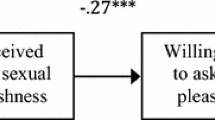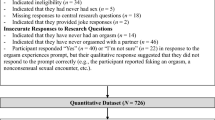Abstract
Orgasm coercion involves pressuring a partner to orgasm by implying that not orgasming will have negative consequences. In the present study, we used mixed methods to explore (1) how various individual and contextual factors—i.e., frequency of orgasm coercion, orgasm frequency, gender/sex, sexual identity, the orgasm coercion tactics used, and perceptions of the perpetrator’s intention—affect relationship and psychological outcomes associated with orgasm coercion, and (2) how different individuals characterize these outcomes. Cisgender women, cisgender men, and gender/sex minority participants (N = 308, M age = 30.44 years, SD = 8.16) described the most recent encounter in which they experienced orgasm coercion and then rated and described the positive and negative relationship and psychological outcomes associated with the incident. Quantitative results showed that the following predicted significantly higher negative relationship and psychological outcomes: a higher frequency of experiencing orgasm coercion, lower frequency of orgasming with partners in general, and experiencing orgasm coercion via physical or emotional threats. Believing that the perpetrator was motivated by altruism or social pressures mitigated these effects. And, experiencing orgasm coercion via implied fault predicted significantly higher negative relationship outcomes only for cisgender women. Additionally, being a sexual minority predicted higher negative relationship (but not psychological) outcomes, whereas being a gender/sex minority predicted higher negative psychological (but not relationship) outcomes. Qualitative results showed that relationship and psychological outcomes varied; for example, participants discussed making a partner happy, disappointment with their partner’s behaviors, ending the relationship, and lasting feelings of anxiety, guilt, and abuse. Together, findings offer new insights into how orgasm coercion affects those who experience it.
Similar content being viewed by others
Data Availability
Questions about data and materials should be directed to the corresponding author, SMvA.
Notes
Typically, we might expect sexual minority participants to have more orgasms overall (Frederick et al., 2018). But, our sexual minority sample was comprised mostly of bisexual/pansexual women, who orgasm at similar rates to heterosexual women.
References
Baier, J. L., Rosenzweig, M. G., & Whipple, E. G. (1991). Patterns of sexual behavior, coercion, and victimization of university students. Journal of College Student Development, 32, 310–322.
Balsam, K. F., Rothblum, E. D., & Beauchaine, T. P. (2005). Victimization over the life span: A comparison of lesbian, gay, bisexual, and heterosexual siblings. Journal of Consulting and Clinical Psychology, 73, 477–487. https://doi.org/10.1037/0022-006X.73.3.477
Benjamini, Y., & Hochberg, Y. (1995). Controlling the false discovery rate: A practical and powerful approach to multiple testing. Journal of the Royal Statistical Society: Series B (methodological), 57, 289–300. https://doi.org/10.1111/j.2517-6161.1995.tb02031.x
Bloor, M., & Wood, F. (2006). Keywords in qualitative methods: A vocabulary of research concepts. Sage.
Boyatzis, R. E. (1998). Transforming qualitative information: thematic analysis and code development. Sage Publications.
Braun, V., & Clarke, V. (2013). Successful qualitative research: A practical guide for beginners. Sage.
Brooks, V. R. (1981). Minority stress and lesbian women. Lexington Books.
Chadwick, S. B., Francisco, M., & van Anders, S. M. (2019). When orgasms do not equal pleasure: Accounts of “bad” orgasm experiences during consensual sexual encounters. Archives of Sexual Behavior, 48, 2435–2459. https://doi.org/10.1007/s10508-019-01527-7
Chadwick, S. B., Grower, P., & van Anders, S. M. (2021). Coercive sexual experiences that include orgasm predict negative psychological, relationship, and sexual outcomes. Manuscript submitted for publication.
Chadwick, S. B., & van Anders, S. M. (2017). Do women’s orgasms function as a masculinity achievement for men? Journal of Sex Research, 54, 1141–1152. https://doi.org/10.1080/00224499.2017.1283484
Chadwick, S. B., & van Anders, S. M. (2021). Orgasm coercion: Overlaps between pressuring someone to orgasm and sexual coercion. Archives of Sexual Behavior. https://doi.org/10.1007/s10508-021-02156-9
Cochran, B. N., Stewart, A. J., Ginzler, J. A., & Cauce, A. M. (2002). Challenges faced by homeless sexual minorities: Comparison of gay, lesbian, bisexual, and transgender homeless adolescents with their heterosexual counterparts. American Journal of Public Health, 92, 773–777. https://doi.org/10.2105/AJPH.92.5.773
de Visser, R. O., Rissel, C. E., Richters, J., & Smith, A. M. A. (2007). The impact of sexual coercion on psychological, physical, and sexual well-being in a representative sample of Australian women. Archives of Sexual Behavior, 36, 676–686. https://doi.org/10.1007/s10508-006-9129-0
du Prel, J.-B., Hommel, G., Röhrig, B., & Blettner, M. (2009). Confidence interval or p-value? Deutsches Ärzteblatt International, 106, 335–339. https://doi.org/10.3238/arztebl.2009.0335
Fahs, B. (2014). Coming to power: Women’s fake orgasms and best orgasm experiences illuminate the failures of (hetero)sex and the pleasures of connection. Culture, Health & Sexuality, 16, 974–988. https://doi.org/10.1080/13691058.2014.924557
Fahs, B., & Swank, E. (2016). The other third shift?: Women’s emotion work in their sexual relationships. Feminist Formations, 28, 46–69. https://doi.org/10.1353/ff.2016.0043
Fahs, B., & Swank, E. (2021). Reciprocity, partner pressure, and emotional labor: Women discuss negotiations around oral and anal sex. Sexuality & Culture, 25, 217–234. https://doi.org/10.1007/s12119-020-09766-w
Frederick, D. A., John, H. K. S. T., Garcia, J. R., & Lloyd, E. A. (2018). Differences in orgasm frequency among gay, lesbian, bisexual, and heterosexual men and women in a U.S. national sample. Archives of Sexual Behavior, 47, 273–288. https://doi.org/10.1007/s10508-017-0939-z
Frith, H., & Kitzinger, C. (1997). Talk about sexual miscommunication. Women’s Studies International Forum, 20, 517–528. https://doi.org/10.1016/S0277-5395(97)87415-8
Hatzenbuehler, M. L. (2009). How does sexual minority stigma “get under the skin”? A psychological mediation framework. Psychological Bulletin, 135, 707–730. https://doi.org/10.1037/a0016441
Heiman, J. R. (2007). Orgasmic disorders in women. In S. R. Leiblum (Ed.), Principles and practice of sex therapy (pp. 84–123). The Guilford Press.
Katz, J., & Myhr, L. (2008). Perceived conflict patterns and relationship quality associated with verbal sexual coercion by male dating partners. Journal of Interpersonal Violence, 23, 798–814. https://doi.org/10.1177/0886260507313949
Katz, J., & Tirone, V. (2009). Women’s sexual compliance with male dating partners: Associations with investment in ideal womanhood and romantic well-being. Sex Roles, 60, 347–356. https://doi.org/10.1007/s11199-008-9566-4
Kern, S. G., & Peterson, Z. D. (2020). From freewill to force: Examining types of coercion and psychological outcomes in unwanted sex. Journal of Sex Research, 57, 570–584. https://doi.org/10.1080/00224499.2019.1671302
Krahé, B., & Berger, A. (2013). Men and women as perpetrators and victims of sexual aggression in heterosexual and same-sex encounters: A study of first-year college students in Germany. Aggressive Behavior, 39, 391–404. https://doi.org/10.1002/ab.21482
Lavie-Ajayi, M., & Joffe, H. (2009). Social representations of female orgasm. Journal of Health Psychology, 14, 98–107. https://doi.org/10.1177/1359105308097950
Levin, R. J., & van Berlo, W. (2004). Sexual arousal and orgasm in subjects who experience forced or non-consensual sexual stimulation – a review. Journal of Clinical Forensic Medicine, 11, 82–88. https://doi.org/10.1016/j.jcfm.2003.10.008
Livingston, J. A., Buddie, A. M., Testa, M., & VanZile-Tamsen, C. (2004). The role of sexual precedence in verbal sexual coercion. Psychology of Women Quarterly, 28, 287–297. https://doi.org/10.1111/j.1471-6402.2004.00146.x
Martin-Storey, A., Paquette, G., Bergeron, M., Dion, J., Daigneault, I., Hébert, M., & Ricci, S. (2018). Sexual violence on campus: Differences across gender and sexual minority status. Journal of Adolescent Health, 62, 701–707. https://doi.org/10.1016/j.jadohealth.2017.12.013
Mascha, E. J., Dalton, J. E., Kurz, A., & Saager, L. (2013). Understanding the mechanism: Mediation analysis in randomized and nonrandomized studies. Anesthesia & Analgesia, 117, 980–994. https://doi.org/10.1213/ANE.0b013e3182a44cb9
Meyer, I. H. (2003). Prejudice, social stress, and mental health in lesbian, gay, and bisexual populations: Conceptual issues and research evidence. Psychological Bulletin, 129, 674–697. https://doi.org/10.1037/0033-2909.129.5.674
Muehlenhard, C. L., & Peterson, Z. D. (2004). Conceptualizing sexual violence: Socially acceptable coercion and other controversies. In A. G. Miller (Ed.), The social psychology of good and evil (pp. 240–268). The Guilford Press.
Muehlenhard, C. L., & Shippee, S. K. (2010). Men’s and women’s reports of pretending orgasm. Journal of Sex Research, 47, 552–567. https://doi.org/10.1080/00224490903171794
Nicolson, P., & Burr, J. (2003). What is ‘normal’ about women’s (hetero)sexual desire and orgasm?: A report of an in-depth interview study. Social Science & Medicine, 57, 1735–1745. https://doi.org/10.1016/S0277-9536(03)00012-1
Opperman, E., Braun, V., Clarke, V., & Rogers, C. (2014). “It feels so good it almost hurts”: Young adults’ experiences of orgasm and sexual pleasure. Journal of Sex Research, 51, 503–515. https://doi.org/10.1080/00224499.2012.753982
Oswald, D. L., & Russell, B. L. (2006). Perceptions of sexual coercion in heterosexual dating relationships: The role of aggressor gender and tactics. Journal of Sex Research, 43, 87–95. https://doi.org/10.1080/00224490609552302
Rothman, E. F., Exner, D., & Baughman, A. L. (2011). The prevalence of sexual assault against people who identify as gay, lesbian, or bisexual in the United States: A systematic review. Trauma, Violence, & Abuse, 12, 55–66. https://doi.org/10.1177/1524838010390707
Salisbury, C. M. A., & Fisher, W. A. (2014). “Did you come?” A qualitative exploration of gender differences in beliefs, experiences, and concerns regarding female orgasm occurrence during heterosexual sexual interactions. Journal of Sex Research, 51, 616–631. https://doi.org/10.1080/00224499.2013.838934
Sandelowski, M. (2000). Whatever happened to qualitative description? Research in Nursing & Health, 23, 334–340. https://doi.org/10.1002/1098-240X(200008)23:4%3c334::AID-NUR9%3e3.0.CO;2-G
Satinsky, S., & Jozkowski, K. (2014). Sexual coercion and behavior among a sample of sexual minority women. Women & Health, 54, 77–93. https://doi.org/10.1080/03630242.2013.876487
Shrout, P. E., & Bolger, N. (2002). Mediation in experimental and nonexperimental studies: New procedures and recommendations. Psychological Methods, 7, 422–445. https://doi.org/10.1037/1082-989X.7.4.422
Smith, J. A. (2015). Qualitative psychology: A practical guide to research methods. Sage.
Straus, M. A., & Douglas, E. M. (2004). A short form of the revised conflict tactics scales, and typologies for severity and mutuality. Violence and Victims, 19, 507–520. https://doi.org/10.1891/vivi.19.5.507.63686
Struckman-Johnson, C. (1988). Forced sex on dates: It happens to men, too. Journal of Sex Research, 24, 234–241.
Struckman-Johnson, C., & Struckman-Johnson, D. (1993). College men’s and women’s reactions to hypothetical sexual touch varied by initiator gender and coercion level. Sex Roles, 29, 371–385. https://doi.org/10.1007/BF00289430
Struckman-Johnson, C., & Struckman-Johnson, D. (1994). Men pressured and forced into sexual experience. Archives of Sexual Behavior, 23, 93–114. https://doi.org/10.1007/BF01541620
Struckman-Johnson, C., Struckman-Johnson, D., & Anderson, P. B. (2003). Tactics of sexual coercion: When men and women won’t take no for an answer. Journal of Sex Research, 40, 76–86. https://doi.org/10.1080/00224490309552168
Vaismoradi, M., Turunen, H., & Bondas, T. (2013). Content analysis and thematic analysis: Implications for conducting a qualitative descriptive study. Nursing & Health Sciences, 15, 398–405. https://doi.org/10.1111/nhs.12048
van Anders, S. M. (2015). Beyond sexual orientation: Integrating gender/sex and diverse sexualities via sexual configurations theory. Archives of Sexual Behavior, 44, 1177–1213. https://doi.org/10.1007/s10508-015-0490-8
Wiederman, M. W. (2005). The gendered nature of sexual scripts. The Family Journal, 13, 496–502. https://doi.org/10.1177/1066480705278729
Yarrish, C., Groshon, L., Mitchell, J., Appelbaum, A., Klock, S., Winternitz, T., & Friedman-Wheeler, D. (2019). Finding the signal in the noise: Minimizing responses from bots and inattentive humans in online research. The Behavior Therapist, 42, 235–242.
Zweig, J. M., Crockett, L. J., Sayer, A., & Vicary, J. R. (1999). A longitudinal examination of the consequences of sexual victimization for rural young adult women. Journal of Sex Research, 36, 396–409. https://doi.org/10.1080/00224499909552012
Acknowledgements
This research was conducted as a part of Sara B. Chadwick’s dissertation in the Departments of Psychology and Women’s and Gender Studies, University of Michigan, Ann Arbor, MI.
Author information
Authors and Affiliations
Corresponding author
Ethics declarations
Conflict of interest
The authors declare that they have no conflict of interest.
Ethical Approval
This research was supported by the International Academy of Sex Research via a Student Research Development Award to SBC. This research was also undertaken, in part, thanks to funding from the Canada 150 Research Chairs program to SMvA.
Research Involving Human Participants
All procedures performed in studies involving human participants were in accordance with the ethical standards of the institutional and/or national research committee and with the 1964 Helsinki Declaration and its later amendments or comparable ethical standards.
Informed Consent
Informed consent was obtained from all individual participants included in the study.
Additional information
Publisher's Note
Springer Nature remains neutral with regard to jurisdictional claims in published maps and institutional affiliations.
Rights and permissions
About this article
Cite this article
Chadwick, S.B., van Anders, S.M. Orgasm Coercion and Negative Relationship and Psychological Outcomes: The Role of Gender, Sexual Identity, Perpetration Tactics, and Perceptions of the Perpetrator’s Intentions. Arch Sex Behav 51, 653–671 (2022). https://doi.org/10.1007/s10508-021-02162-x
Received:
Revised:
Accepted:
Published:
Issue Date:
DOI: https://doi.org/10.1007/s10508-021-02162-x




